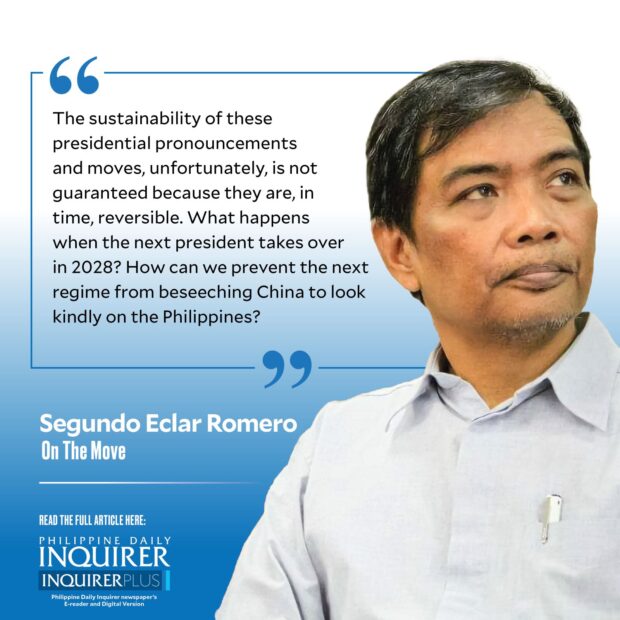
The sustainability of these presidential pronouncements and moves, unfortunately, is not guaranteed because they are, in time, reversible. What happens when the next president takes over in 2028? How can we prevent the next regime from beseeching China to look kindly on the Philippines?
While Marcos Sr. was a visionary regarding the Philippine maritime domain, we forget that he created institutions to provide him with robust and reliable evidence-based and nationalist foreign policy advice. Among these institutions was the President’s Center for Special Studies (PCSS), established in 1979 but dissolved by the Cory Aquino administration when it took over.
There are understandable reasons why the PCSS was terminated by Aquino. The PCSS had the reputation of being the intellectual backbone and ideological production arm of the Marcos regime.
But the PCSS was also the think tank that not only sought to illuminate wicked Philippine problems like the Moro and communist insurgency and gaps in understanding of Philippine history, general awareness of national political and economic issues, national pride, and trust in the government. It was also the primary think tank studying and advancing the Philippine interests in the Spratlys and the maritime domain we now call the West Philippine Sea.
It was a strategic loss to the Philippines, for the PCSS could have been reengineered to continue its policy research on national security and national interest to inform national policy-making, especially in an increasingly turbulent policy environment.
The PCSS was formerly the Philippine Center for Advanced Studies (PCAS), which was created by Marcos Sr. in the Asian Center at the University of the Philippines. As a creation of martial law, it was predictable that the PCAS would be rocked and rejected by the University community, and in 1979 was converted into the PCSS and housed in a nondescript two-floor building away west of the Cubao area away from major thoroughfares. The PCSS was headed by Adrian Cristobal, an intellectual and journalist who joined the Marcos administration; it was staffed by professors and researchers from the University of the Philippines.
The absence of the PCSS was muted during the Ramos administration when National Security Adviser Jose T. Almonte, the moving force behind the PCAS and PCSS, actively and creatively promoted Philippine national and foreign policy interests in Asean and regional policy circles.
For the Philippines as a David battling the behemoth Chinese Goliath, every little institutional slingshot can deliver debilitating blows. The Chinese have a phalanx of 10 major think tanks led by the Chinese Academy of Social Sciences and the Development Research Center of the State Council in the service of the central government and related authorities. As for the Philippines, we have severely underfunded nongovernmental think tanks that seek funding for every conference or workshop they host. These think tanks wage a valiant campaign using guerrilla logistics and tactics. There are also government think tanks, but few have the comprehensive, multidimensional, and farsighted mandates and resources to put up a decent national strategic and future thinking effort.
Mr. Marcos does not have to start from scratch. He can build on and repurpose suitable existing government institutions into a Center for Strategic and Development Studies. One such institution, with the professionalism, tradition for strategic thinking, public management innovation, and a broad range of competencies is the Development Academy of the Philippines (DAP). It was the DAP that established critical institutions like the Foreign Service Institute, the Career Executive Service Development Program, and the Philippine Quality Award System. The DAP has a building in Pasig City, an expanded training center in Tagaytay City, and a DAP in Mindanao. It has several centers for governance, knowledge management, productivity, and a solid graduate school of public and development management. With sufficient logistics, intellectual power, and access to the President, the DAP can play a pivotal role in the strategic visioning and management of the nation.
doyromero@gmail.com